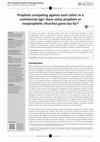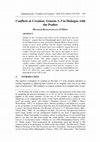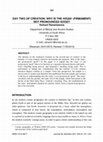Papers by Hulisani Ramantswana

Hts Teologiese Studies-theological Studies, 2021
In recent years, there is growing concern with some of the bizarre practices in some neoprophetic... more In recent years, there is growing concern with some of the bizarre practices in some neoprophetic churches. Amongst the concerns raised are the bizarre practices and the commercialisation of churches with claims that churches are being turned into lucrative businesses. In this article, the relationship amongst prophets, churches and commerce is explored, focusing on competitive behaviour in an open market or free market. The article engages the following issues: firstly, the issue of religious marketing in the context of a free market and consumerism; secondly, branding faith in relation to competition between churches and brands of prophets and thirdly, fraudulent activities facilitated by prophets. Contribution: The article provides a critical assessment of the practices of prophets and neoprophetic churches considering their commercial interests. Thus, the study points to the intersection between religion and commerce.
Old Testament Essays, 2021
Professor David Tuesday Adamo has published widely in various journals, and his contribution to O... more Professor David Tuesday Adamo has published widely in various journals, and his contribution to Old Testament scholarship in Africa cannot be underestimated. This article focuses on his publications in Old Testament Essays since 2003. Adamo has been one of the loyal African contributors to our journal and is the first black African Old Testament scholar in Africa to be honoured in this way in this journal. Therefore, this article reviews Adamo's contributions over the years, particularly focusing on the distinctive readings of the Old Testament that he brought to Old Testament Essays through his publications.
The use and Abuse of the Spirit in Pentecostalism , 2020
Old Testament scholarship in South Africa has deepened, broadened, and evolved over the years; an... more Old Testament scholarship in South Africa has deepened, broadened, and evolved over the years; and various trails can be traced within it. The article interrogates whether Old Testament scholarship has passed the glorious age. The following issues are explored: First, the retirement of scholars in recent years as a signal of the coming to an end of the second-generation of Old Testament scholars in South Africa; second, the developments in black Old Testament scholarship as a trail which developed alongside white Old Testament scholarship; and third, the prospects of Old Testament scholarship from a decolonial perspective. This article argues that the future of Old Testament Scholarship in (South) Africa is in a blackening, that is, a redress process through broadening of the scholarship to reflect the continent in which it has to thrive .
In die Skriflig / In Luce Verbi
Old Testament Essays
This article engages in a decolonial reading of Ps 137 in light of South African songs of struggl... more This article engages in a decolonial reading of Ps 137 in light of South African songs of struggle. In this reading, Ps 137 is regarded as an epic song which combines struggle songs which originated within the golah community in response to the colonial relations between the oppressor and the oppressed. The songs of struggle then gained new life during the post-exilic period as a result of the new colonial relation between the Yehud community and the Persian Empire. Therefore, Ps 137 should be viewed as not a mere song, but an anthology of songs of struggle: a protest song (vv. 1-4), a sorrow song (vv. 5-6), and a war song (vv. 7-9).
HTS Teologiese Studies / Theological Studies
The rape incident outlined in this paragraph was used with permission from the victim of the rape... more The rape incident outlined in this paragraph was used with permission from the victim of the rape. 2.In the Zulu culture, the term imbokodo is used for a 'grinding stone'-a resistant and durable stone mainly used by women in the household for processing materials through pounding and pestling. As Nzimande (2008:223) in her book chapter entitled 'Reconfiguring Jezebel: A Postcolonial Imbokodo Reading of the Story of Naboth's Vineyard (1 Ki 21:1-16)' notes, 'imbokodo symbolises unity, solidarity and strength. Imbokodo is dependable: no matter what the task, it remains intact and unscathed'. See also her PhD dissertation, 'Postcolonial Biblical Interpretation in Post-Apartheid South Africa: The Gebirah in the Hebrew Bible in the Light of Queen Jezebel and the Queen Mother Lemuel' (PhD dissertation,
Decoloniality is a perspective through which structures of domination are questioned and challeng... more Decoloniality is a perspective through which structures of domination are questioned and challenged. Power structures tend to legitimize the relation of superiority-inferiority between those in the position of dominance and the dominated. The social structure of domination results in the distribution of opportunities and resources to favour those in the position of power. The focus of this paper is on the landlessness of the Levites as projected in the Hexateuch, and its argument is that the landlessness of the Levites was a result of the social construction of tribal ranking among the Israelite tribes in which the Joseph tribes assumed the position of power and privilege and, as a result, became more landed than the rest of Israel's tribes, this at the expense of Levites – the landless.

This paper is a critical engagement with Dorothy Bea Akoto-Abutiate's book Proverbs and the Afric... more This paper is a critical engagement with Dorothy Bea Akoto-Abutiate's book Proverbs and the African Tree of Life: Grafting Biblical Proverbs onto Ghanaian Eve Folk Proverbs (Leiden: Brill 2014). In the book, Akoto-Abutiate grafts together the African Ghanaian folk proverbs and the proverbial sayings in Proverbs 25:1-29:27 in order to appropriate the Biblical message in the Ghanaian context. For Akoto-Abutiate the Biblical book of Proverbs or the Bible in general is a 'tree of life' and so is/are the African cultural context(s). She, therefore, suggests the 'hermeneutic of grafting' as the most appropriate model through which engagement between African cultural context(s) and the Biblical text can productively happen without undermining the former. The African cultural context in this model is regarded as the dominant and pre-existing tree of life onto which the Biblical shoot(s) are grafted. This paper engages 'hermeneutic of graft-ing' from a decolonial perspective thereby highlighting the pros and cons of Akoto-Abutiate's approach.
" I shavha i sia muinga i yafhi? " (Running away from your own path, where are you heading?). Thi... more " I shavha i sia muinga i yafhi? " (Running away from your own path, where are you heading?). This Tshivenda proverb highlights the need for people to affirm their own roots. On the basis of the wisdom of the preceding proverb, I will argue from a decolonial perspective that African biblical scholars have to take seriously their own African heritage, the complexity of their social location, show concern for the plight of the grassroots communities, and thus do justice to their contexts rather than relying heavily on Western paradigms. In so doing they will contribute towards shaping the face of biblical hermeneutics.
The recognition of social location as a heuristic device in biblical hermeneutics does not necess... more The recognition of social location as a heuristic device in biblical hermeneutics does not necessarily equate to the production of radical and alternative knowledge. From our own social location (Africa), biblical hermeneutics has to deal with the dynamics of coloniality. Africa, especially South Africa as a social location, is still burdened by coloniality. The orientation of African biblical hermeneutics has to be decolonial if it is to overcome the persistence of coloniality by privileging African knowledge systems and African thinkers. It also has to unmask the structures of coloniality that continue to destabilise the African imagination. The emergence of African biblical hermeneutics does not imply that the colonial systems have been overcome – coloniality is able to survive and thrive even under the tag " African " .

The issue of “land” in South Africa remains a political and emotive one as the country reaches th... more The issue of “land” in South Africa remains a political and emotive one as the country reaches the centenary of the Native Land Act of 1913. The latter Act was aimed at limiting blacks their rights to land. Even today, the majority of black South Africans are still awaiting the fulfilment of the promise for the Promised Land. The promise remains unfulfilled on two fronts: First, the government’s land reform programme has failed to deliver on the promise to return the land, even as wealth basically remains in the hands of the minority, the historical winners. Second, the wealth from the mining and agricultural sectors lies in the low costs of production through cheap labour of basically indigenous peoples. In the global world economy, South Africa is one of the biggest exporter of mineral resources and agricultural products. However, as the sage has rightly expressed it, “The field of the poor may yield much food, but it is swept away through injustice” (Prov 13:23, NRSV). In this article, we use the Tshivenda proverb, lupfumo lu mavuni, literally rendered—“wealth is in the land,” as a hermeneutical lens to examine the Old Testament concept of “Promised Land,” within selected texts, in particular, within the context of Moses’ call (Exod 3-4). If the biblical theme of “Promised Land” is reread through the eyes of the indigenous peoples of South Africa, people who continue to await the “Promise of land”, what kind of reading might emerge?
The Western colonial system not only colonised African human beings, it also colonised nature, wi... more The Western colonial system not only colonised African human beings, it also colonised nature, with particular reference to Africa’s wildlife. The colonial system disrupted the harmony that existed between human beings and nature by colonising both, thereby causing a divide between human beings and nature. On the basis of Isa 11:6-9, the argument in this article is that human liberty is intertwined with the liberty of nature. The African human is not free as long as Africa’s wildlife remains colonised. Therefore, decolonisation remains incomplete as long the colonial matrix of power that divides African humans from nature persists.

Eschaton" argued that the Chaoskampf motif which had its origin in the Babylonian account of crea... more Eschaton" argued that the Chaoskampf motif which had its origin in the Babylonian account of creation Enuma Elish is found in two groups of texts: those dealing with the dragon and those dealing with the primal sea. Scholars have since tended to regard the OT as portraying the creation of the universe as the result of a cosmic conflict between God and Chaos. The aim in this paper is not so much to challenge Gunkel's thesis, which others have already done, but to analyse the OT's multiple and diverse voices regarding the protological events. This paper suggests that the relationship between creation and conflict is not that creation occurs through conflict; rather, conflict comes through the process of creation. That is, the fundamental conflict between God and his creatures is evidenced by two conflicts: conflict at sea with Leviathan/Rahab , and conflict on land with the serpent and humankind (Gen 2:4b-3:24).
Genesis 3 is commonly regarded as narrating events subsequent to the "very good" creation. In con... more Genesis 3 is commonly regarded as narrating events subsequent to the "very good" creation. In contrast to the commonly held view, this article suggest that Gen 3 forms part and parcel of the creation process and thereby, the second creation narrative as a whole (Gen 2:4b-3:24) taps into the absence of the evaluative formula with regard to the human creation cycle in Gen 1:26-30. The creation process in Gen 2:4b-3:24 is presented as an "undoing" of the negatives in the initiating verse, Gen 2:5, and all the negatives introduced within the creation process with the exception of the negative in Gen 3:22 Thus humanity is not singled out as good in Gen 1:26-30 because humanity at the end of the creation process dies.
The creation of humanity on day six of creation is the climax of creation ; however, there is an ... more The creation of humanity on day six of creation is the climax of creation ; however, there is an anomaly at this climactic moment of creation, which interpreters tend to overlook: humanity is not singled out as "good." The anomaly is accentuated by the fact that the final evaluative formula, "and God saw everything that he made, and behold, it was very good" (Gen 1:31), which is generally regarded as encompassing creation activities from the first day to the sixth day. This necessitates the question: why is humanity not singled out as "good," as with most of the creation activities? This article suggests that the answer to this question rests in the dialogic relationship

The absence of the evaluative formula on the second day of creation in the Genesis 1:1-2:4a creat... more The absence of the evaluative formula on the second day of creation in the Genesis 1:1-2:4a creation narrative necessitates the question: Why is the rāqîa' not pronounced -good‖? In this paper, it is argued that the rāqîa' is not pronounced -good‖ due to its function as a separator between heaven and earth -God's dwelling being heaven, and humanity's dwelling being earth. This is particularly so taking into consideration that the Genesis 1:1-2:4a creation narrative depicts creation as a temple. From this perspective, the temple is a microcosm of creation and therefore the parallelism between temple and creation is the key to understanding why the rāqîa' is not pronounced ‗good'. The rāqîa' correlates with the parōket, the inner veil of the temple, which functioned as the barrier of the Most Holy Place, Yahweh's dwelling. Thus, the establishment of the rāqîa' anticipated a dualism of creation, which, from a canonical perspective, has to be overcome.










Uploads
Papers by Hulisani Ramantswana